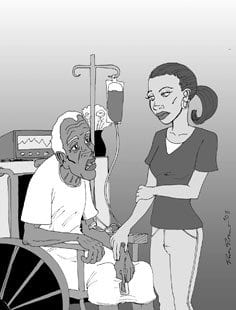
Medical care abuse
|
|
“With the cuts in Medicaid, you don’t want to get sick in Massachusetts.” |
The collapse of the Wall Street financial markets has created a fiscal crisis in the states. Gov. Deval Patrick last summer approved a state budget of $28.1 billion for fiscal year 2009. However, after the failing economy led the governor to call for a revised estimate of expected state revenues, Secretary of Administration and Finance Leslie Kirwan last month forecast a shortfall of $1.4 billion. The law requires that the budget be brought into balance, foretelling cuts to state programs and services.
Whenever there is a call for budget cuts, working-class people expect to take a hit. That is happening now. The safety-net hospitals have become one of the main targets. Boston Medical Center received notice that it will not be paid $64 million for Medicaid services that it has already provided. The understanding is that this bill is always paid retroactively.
In addition, the proposal for the future Medicaid cut for BMC is to be $30 million. It is unconscionable that the state would renege on its commitment and leave BMC in this hole. And it is tragic that the state will so reduce future medical services for the poor, especially since the U.S. government picks up half of the tab.
In these financially troubled times, everyone is expected to adjust to the necessary budget cuts, but so much more is expected of those with a modest income. Society demands that they sacrifice their health care and consequently endanger their very lives. It is inhumane for an affluent society to make such a demand, regardless of the severity of the necessary budget cuts. There must be no curtailment of exceptional health care for every citizen.
A new incentive
The election of Barack Obama as president was both an occasion for celebration and a catalyst for catharsis. Anyone who viewed the unbridled elation in Chicago’s Grant Park when the election results became public could see the joy that many Americans felt with Obama’s victory. Less visible, but also important, was the psychological release of many Americans from the nation’s baleful history of racial discrimination.
By selecting Obama, white citizens proudly cast their votes for change and ignored the conventional notion of black inferiority. With that vote, many African Americans were freed from the ignoble stigma of being second-class citizens and were redeemed by Obama’s magnificent achievement. This spirit of national unity will be very important in the months ahead to help America resolve the most serious economic problem since the Great Depression.
Already, those who feed on negativity have begun efforts to pierce this national enthusiasm. Some black spokesmen have suggested that Obama’s triumph is only an anomaly, supporting their position by pointing to the millions of African Americans who have been unable to prosper. These spokesmen assert that those failures are solely the result of racial discrimination.
How wrong they are. Obama was not born to privilege. Abandoned by his father at a young age, he was raised by his mother and loving grandparents. Many African Americans share a similar story. Despite this unpromising beginning, hard work and innate talent have taken Obama to the White House.
The question, then, is not whether some racial discrimination still exists. Obama’s achievement has clearly demonstrated that in America, racial bigotry is not an absolute barrier. Indeed, some narrow-minded bias exists in every society. The challenge now becomes how to mobilize African Americans so that through education, self-discipline and hard work, they will be able to go as far as their talents can carry them.






